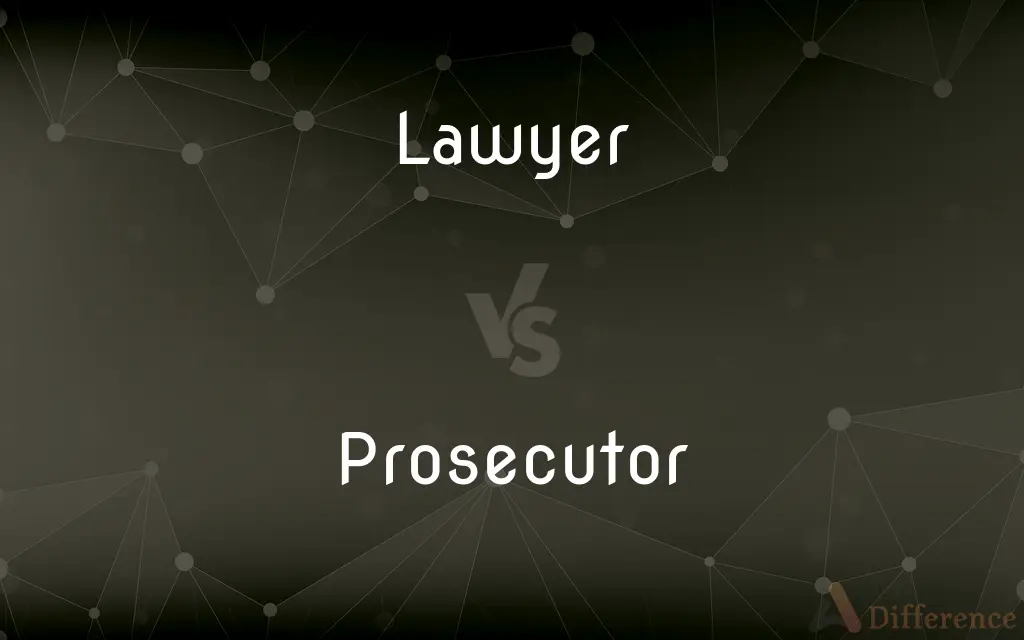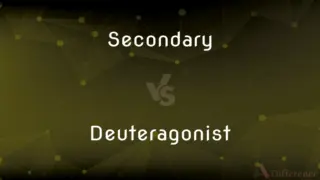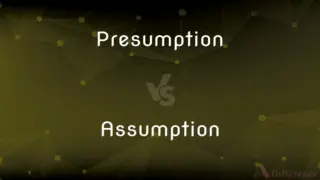Lawyer vs. Prosecutor — What's the Difference?
By Tayyaba Rehman — Updated on September 4, 2023
A lawyer is a professional who practices law, while a prosecutor specifically represents the government in criminal cases.

Difference Between Lawyer and Prosecutor
Table of Contents
ADVERTISEMENT
Key Differences
A lawyer is a broad term that refers to any person who has been trained in law and is licensed to give legal advice or represent clients in legal matters. Lawyers can work in various fields of law, ranging from criminal to corporate, family, or environmental law. On the other hand, a prosecutor is a type of lawyer who represents the government in prosecuting criminal offenses.
While all prosecutors are lawyers, not all lawyers are prosecutors. The primary role of a lawyer, in general, is to advise and represent clients in both civil and criminal cases. Lawyers can work for private law firms, corporations, or individual clients. Prosecutors, conversely, work for the government, whether at the federal, state, or local level, and their main responsibility is to present the state's case against a defendant in criminal court.
One significant distinction between a lawyer and a prosecutor lies in their client base. A lawyer's client could be an individual, a corporation, or even a non-profit. The prosecutor's primary "client" is the state or the government they serve, and their duty is to ensure justice by proving a defendant's guilt beyond a reasonable doubt.
Both lawyers and prosecutors play vital roles in the judicial system. Lawyers ensure that individuals and entities have representation and can navigate the complex legal landscape, while prosecutors work to maintain public safety by holding those who commit crimes accountable.
Comparison Chart
Primary Role
Advises and represents clients
Represents the government in criminal cases
ADVERTISEMENT
Client Base
Individuals, corporations, non-profits
The state or government
Fields of Law
Various (e.g., criminal, corporate, family)
Primarily criminal
Employment
Private firms, corporations, self-employed
Government agencies
Objective in Court
Varies (defend client, represent interests, etc.)
Prove defendant's guilt beyond a reasonable doubt
Compare with Definitions
Lawyer
A professional trained in law and licensed to practice.
The accused hired a lawyer to represent him in court.
Prosecutor
A lawyer who seeks to prove the guilt of a defendant on behalf of the state.
With meticulous preparation, the prosecutor presented the case.
Lawyer
A person who defends or prosecutes cases in a court of law.
The lawyer presented compelling arguments during the trial.
Prosecutor
A legal representative of the government in criminal cases.
The prosecutor argued that the evidence clearly pointed to the defendant's guilt.
Lawyer
An individual who provides legal advice and representation.
I consulted my lawyer before signing the contract.
Prosecutor
An attorney who initiates and conducts proceedings against someone in a criminal trial.
The prosecutor's office is reviewing the evidence for potential charges.
Lawyer
An expert in legal matters and judicial proceedings.
The startup retained a lawyer to handle all their patent applications.
Prosecutor
A legal official who represents the government in court, especially in criminal cases.
The prosecutor's closing statement was a powerful summary of the state's position.
Lawyer
An advocate or counselor who handles legal cases.
As a lawyer, she championed the rights of the underprivileged.
Prosecutor
The chief legal officer in certain jurisdictions responsible for bringing criminals to justice.
The county prosecutor decided to press charges against the accused.
Lawyer
A lawyer or attorney is a person who practices law, as an advocate, attorney at law, barrister, barrister-at-law, bar-at-law, canonist, canon lawyer, civil law notary, counsel, counselor, solicitor, legal executive, or public servant preparing, interpreting and applying the law, but not as a paralegal or charter executive secretary. Working as a lawyer involves the practical application of abstract legal theories and knowledge to solve specific individualized problems, or to advance the interests of those who hire lawyers to perform legal services.
Prosecutor
A prosecutor is a legal representative of the prosecution in countries with either the common law adversarial system or the civil law inquisitorial system. The prosecution is the legal party responsible for presenting the case in a criminal trial against an individual accused of breaking the law.
Lawyer
One whose profession is to give legal advice and assistance to clients and represent them in court or in other legal matters.
Prosecutor
One that prosecutes.
Lawyer
A professional person with a graduate law degree that qualifies for legal work (such as Juris Doctor)
Prosecutor
One that initiates and carries out a legal action, especially criminal proceedings.
Lawyer
A professional person qualified (as by a law degree or bar exam) and authorized to practice law as an attorney-at-law, solicitor, advocate, barrister or equivalent, i.e. represent parties in lawsuits or trials and give legal advice.
A lawyer's time and advice are his stock in trade. - aphorism often credited to Abraham Lincoln, but without attestation
Prosecutor
See prosecuting attorney.
Lawyer
(by extension) A legal layman who argues points of law.
Prosecutor
(law) a prosecuting attorney.
Annie Jay was the Wisconsin government prosecutor in the trial of a man for forging his client's signature.
Lawyer
The burbot.
Prosecutor
(law) a person, as a complainant, victim, or chief witness, who institutes prosecution in a criminal proceeding.
The prosecutor got the witness to admit he was lying.
Lawyer
The stem of a bramble.
Prosecutor
One who prosecutes or carries on any purpose, plan, or business.
Lawyer
Any of various plants. en
Prosecutor
The person who institutes and carries on a criminal suit against another in the name of the government.
Lawyer
To practice law.
Prosecutor
A government official who conducts criminal prosecutions on behalf of the state
Lawyer
(intransitive) To perform, or attempt to perform, the work of a lawyer.
Lawyer
(intransitive) To make legalistic arguments.
Lawyer
To barrage (a person) with questions in order to get them to admit something.
You've been lawyered!
Lawyer
One versed in the laws, or a practitioner of law; one whose profession is to conduct lawsuits for clients, or to advise as to prosecution or defence of lawsuits, or as to legal rights and obligations in other matters. It is a general term, comprehending attorneys, counselors, solicitors, barristers, sergeants, and advocates.
Lawyer
The black-necked stilt. See Stilt.
Lawyer
A professional person authorized to practice law; conducts lawsuits or gives legal advice
Common Curiosities
What does a lawyer do?
A lawyer provides legal advice, represents clients, and handles legal proceedings.
Who does a prosecutor represent?
A prosecutor represents the government in criminal cases.
Can a lawyer work as a prosecutor?
Yes, a prosecutor is a type of lawyer who works for the government.
Do prosecutors handle civil cases?
Typically no, prosecutors handle criminal cases on behalf of the government.
Who does a lawyer answer to?
Lawyers answer to their clients, their firm (if applicable), and the legal and ethical standards of their profession.
Is it possible for a prosecutor to become a judge?
Yes, many judges have backgrounds as prosecutors.
Can a lawyer switch to being a prosecutor?
Yes, a lawyer can switch roles if they meet the requirements to be a prosecutor in their jurisdiction.
Is every attorney a lawyer?
Yes, every attorney is a lawyer, but the terms are often used interchangeably in the U.S.
What's the main goal of a prosecutor in a trial?
The main goal is to prove the defendant's guilt beyond a reasonable doubt.
Do all lawyers go to court?
No, not all lawyers litigate; some may specialize in areas like transactional law.
Who pays a prosecutor's salary?
The government (federal, state, or local) pays the prosecutor's salary.
Do prosecutors always seek a guilty verdict?
Prosecutors seek justice, which may not always mean pursuing a guilty verdict if the evidence doesn't support it.
How are prosecutors appointed or hired?
Procedures vary; some are elected, while others are appointed by government officials.
What's the difference between a defense lawyer and a prosecutor?
A defense lawyer represents the accused, while a prosecutor represents the government seeking to prove the accused's guilt.
Where do lawyers typically work?
Lawyers can work in private firms, corporations, for the government, non-profits, or be self-employed.
Share Your Discovery

Previous Comparison
Secondary vs. Deuteragonist
Next Comparison
Presumption vs. AssumptionAuthor Spotlight
Written by
Tayyaba RehmanTayyaba Rehman is a distinguished writer, currently serving as a primary contributor to askdifference.com. As a researcher in semantics and etymology, Tayyaba's passion for the complexity of languages and their distinctions has found a perfect home on the platform. Tayyaba delves into the intricacies of language, distinguishing between commonly confused words and phrases, thereby providing clarity for readers worldwide.
















































